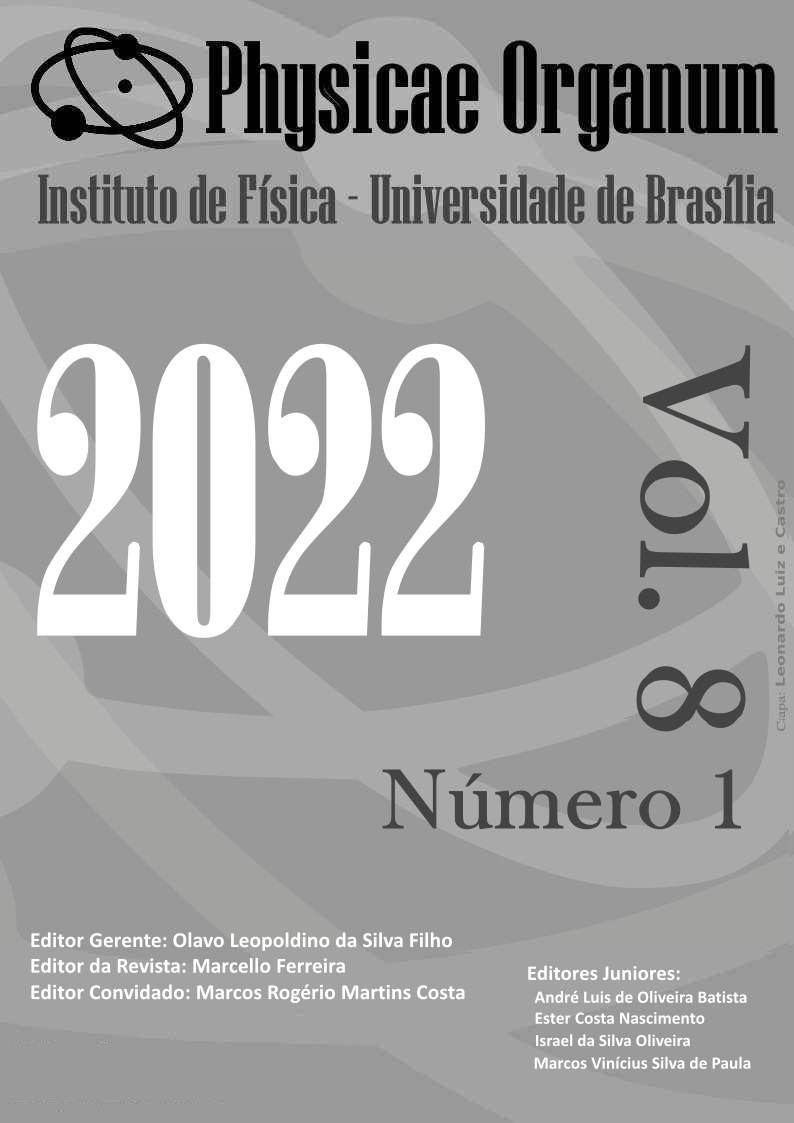A UNIVERSE IN A DROP OF WATER: AN INVESTIGATIVE TEACHING APPROACH ABOUT AQUATIC ECOSYSTEMS
Keywords:
Teaching by research. Single-celled algae. Photosynthesis. Aquatic ecosystems. Middle school.Abstract
Different learning and teaching strategies have been adopted in Brazil so that Science can go beyond the teaching process as well as becomes a source of development and competence to the students; all according to the changes occurred in the 21st century. This research is based on conception, study application and data analysis of a didactic exploratory study concerning the role of unicellular algae in the food chain of aquatic ecosystems. It has been applied to 8th grade students from middle school in their final years, around August and September of 2021. The didactic structure is proceeding from constructivism and social interactionism theories. During the whole investigative studying path, the students were challenged to hold up their previous knowledge on the topics and they could also share them in class on the target subjects. Over the survey procedure, there was a notable growing in terms of the pupils understanding about the function of unicellular algae, thus showing qualifications in their capacity to express, argue and apply the developed concepts. When compared, their prior answers demonstrate meaningful conceptual changes upon the photosynthesizing function of microalgae, such as its fundamental role in the food chain, thus contributing to the proposed didactic sequence as an efficient strategy for teaching and learning about the functioning of aquatic ecosystems in Middle School.
Downloads
References
AGUIAR, L. C. C.; BIANCHI, C. S.; FERREIRA, Y. C. S; SILVA, M. M.; THIMÓTEO, Rachell Ramalho Correia. Concepções sobre algas na educação básica como ponto de partida pra reflexões no ensino de Ciências e Biologia. E-mosaico, v. 2, n. 4, p. 01-16, dez., 2013.
AUSUBEL, D. P.; NOVAK, J. D.; HANESIAN, H. Psicologia educacional. Rio de Janeiro: Interamericana, 1980.
AUSUBEL, D. P. Educational psychology: a cognitive view. New York: Holt, Rinehart and Winston, 1968.
BARREIRA, C.; BOAVIDA, J.; ARAÚJO, N. Avaliação formativa: novas formas de ensinar e aprender. Revista portuguesa de pedagogia, v. 2, n. 40, p. 95-133, 2006.
BRASIL. Ministério da Educação. Base Nacional Comum Curricular. Brasília: MEC, 2018.
DISTRITO FEDERAL. Secretaria de Estado de Educação do Distrito Federal. Currículo em Movimento do Distrito Federal: Ensino Fundamental anos iniciais - anos finais, 2018.
CAETANO, L. M. A epistemologia genética de Jean Piaget. ComCiência, n. 120, v. 1, n. 120, p. 130-136, 2010.
CARVALHO, A. M. P. Fundamentos Teóricos e Metodológicos do Ensino por Investigação. RBPEC, v. 18, n. 3, p. 765–794, 2018.
COLOMBO, I. M.; ANJOS, D. A. S.; ANTUNES, J. R. PESQUISA TRANSLACIONAL EM ENSINO: UMA APROXIMAÇÃO. Educação Profissional e Tecnológica em Revista, v. 3, n. 1, p. 51-70 2019.
DEBOER, G. E.Historical Perspectives onInquiry Teaching in Schools. In: FLICK, L. D.; LEDERMAN, N. G. (Eds.). Scientific Inquiry and Nature of Science. Netherland, NED, Springer, p.17-35, 2006.
DRIVER, R.; ASOKO, H.; LEACH, J.; MORTIMER, E. e SCOTT, P. Constructing scientific knowledge in the classroom. Educational Researcher, n. 7, p. 5-12, 1994. Tradução de MORTIMER, E. Construindo conhecimento científico em sala de aula. Química Nova na Escola, n. 9, p. 31-40,1999.
ESTEVES, F. A. Fundamentos de limnologia. Interciência, Rio de Janeiro: 1998. 602p.
GEWANDSZNAJDER, F. Teláris Ciências, Ensino Fundamental Anos Finais/ Fernando Gewandsznajder, Helena Pacca. 3. Ed.- São Paulo; Ática, 2018.
KESSELRING, T. Jean Piaget. Petrópolis: Vozes, 1993.
MACHADO, A. L. S.; ZANETI, I C. B. B.; HIGUCHI, M. I. G.A degradação dos cursos hídricos urbanos, uma abordagem sobre gestão e educação ambiental. RIAEE – Revista Ibero-Americana de Estudos em Educação, Araraquara, v. 14, n. 3, p. 1124-1138, jul./set., 2019.
MUNFORD, D.; LIMA, M. E. C. de C. Ensinar ciências por investigação: em que estamos de acordo? Ensaio Pesquisa em Educação em Ciências (Belo Horizonte), v. 9, n. 1, p. 89-111, 2007.
PECHLIYE, M.; BANDEIRA, C. M. S; JORDÃO, R. S. Por que as algas e bactérias não são amplamente reconhecidas como seres fotossintetizantes? Enseñanza de las ciencias: revista de investigación y experiencias didácticas, [en línea], n. extra, p. 2265-9, 2013.
SANTOS, A. O.; OLIVEIRA, G. S.; JUNQUEIRA, A. M. R. Relações entre aprendizagem e desenvolvimento em Piaget e Vygotsky: o construtivismo em questão. Itinerarius Reflectionis, v. 10, n. 2, p. 1-31, 2014.
SASSERON, L. H.; CARVALHO, A. M. P. Alfabetização Científica: uma revisão Bibliográfica. Investigações em Ensino de Ciências, v. 16, n. 1, p. 59-77, 2011.
SOUZA, S. C.; ALMEIDA, M. J. P. M. A fotossíntese no ensino fundamental: compreendendo as interpretações dos alunos. Ciência & Educação (Bauru), v. 8, n. 1, p. 97-111, 2002.
VYGOTSKY, L. S. Obras Escogidas: problemas de psicologia geral. Madri: Gráficas Rogar, Fuenlabrada, 1982.
Downloads
Published
How to Cite
Issue
Section
License
Copyright (c) 2022 Physicae Organum

This work is licensed under a Creative Commons Attribution-NonCommercial-ShareAlike 4.0 International License.
Autores que publicam nesta revista concordam com os seguintes termos:
Autores mantém os direitos autorais e concedem à revista o direito de primeira publicação, sendo o trabalho simultaneamente licenciado sob a Creative Commons Attribution License o que permite o compartilhamento do trabalho com reconhecimento da autoria do trabalho e publicação inicial nesta revista.
Autores têm autorização para assumir contratos adicionais separadamente, para distribuição não-exclusiva da versão do trabalho publicada nesta revista (ex.: publicar em repositório institucional ou como capítulo de livro), com reconhecimento de autoria e publicação inicial nesta revista.
Autores têm permissão e são estimulados a publicar e distribuir seu trabalho online (ex.: em repositórios institucionais ou na sua página pessoal) a qualquer ponto antes ou durante o processo editorial, já que isso pode gerar alterações produtivas, bem como aumentar o impacto e a citação do trabalho publicado (Veja O Efeito do Acesso Livre).




